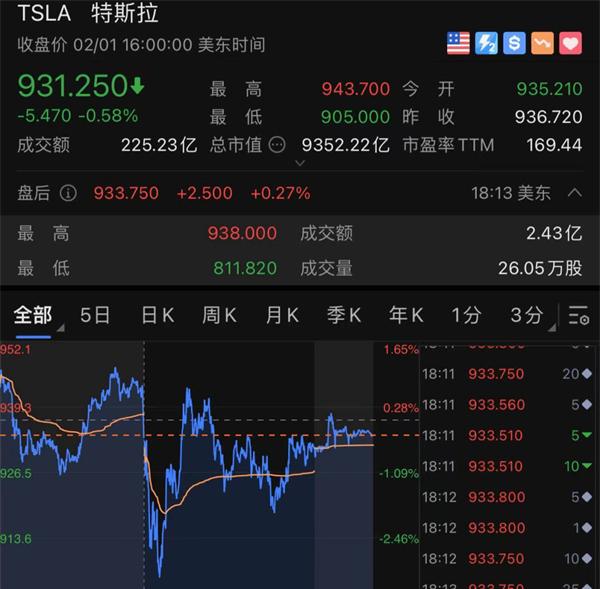Tesla was forced to remove a parking feature from its autopilot software because U.S. regulators deemed it a safety hazard, and to recall vehicles equipped with related features.
On Tuesday (February 1), local time, Tesla recalled 53,822 cars located in the United States at the request of the National Highway Traffic Safety Administration (NHTSA).
NHTSA said the recall covers parts of the 2016-2022 Model S and Model X, the 2017-2022 Model 3 and the 2020-2022 Model Y.
NHTSA said the cars, which are equipped with Tesla's FSD Beta software, could undergo "rolling stops," posing a safety risk. NHTSA said Tesla will also implement OTA software updates to ban vehicles from "rolling parking."
On the day of the announcement of the recall, Tesla's stock price fell back on Tuesday after rising more than 10% on Monday, fell nearly 3.4% at the morning refresh daily low, and then turned up more than once, but failed to keep the rally, and finally closed down nearly 0.58%, ending a two-day streak of gains.

The autonomous driving system is flawed
Tesla recalled 54,000 U.S. cars
On Tuesday, February 1, EST, the National Highway Traffic Safety Administration (NHTSA) announced that Tesla will recall a total of nearly 54,000 vehicles, involving the installation of fully automatic assisted driving software Full Self-Driving (FSD) Beta 2020.40.4.10 or a newer version of the system Model 3, Model S, Model X, ModelY models, dating back to 2016 production.
Image source: Visual China
The report also shows that Tesla will remove the so-called "rolling stop" function of the FSD software by releasing a new version of the software upgrade on the Internet. This feature was implemented in a software update version of Tesla on October 20 last year.
The feature allows cars to drive through "all-way stop" intersections where signs show stops in all four directions, at a maximum speed of 5.6 miles (9 kilometers) per hour, without detecting that there are no vehicles, pedestrians, or cyclists nearby.
Image source: NHTSA
The feature violates a number of state and local laws that require vehicles to park at "all-way stops," prompting NHTSA to investigate Tesla.
The regulator, NHTSA, believes that Tesla's above software features violate the traffic laws of most states in the United States, and once it is really allowed to drive like that, the traffic police will issue a ticket to the driver. NHTSA said it didn't know which state would allow rolling parking, and allowing such a feature increased the risk of crashes.
After two meetings with NHTSA officials in January, Tesla agreed to remove the rolling parking feature, recall the vehicles involved, and said that, to its knowledge, no warranty claims, crashes, injuries or deaths related to the recalls had been identified.
Last week, the number of FSD Beta vehicles in the U.S. increased to nearly 60,000 from a few thousand at the end of September last year. Tesla said it has been testing improved versions of its FSD on public roads, but it has reiterated several times that "these features don't make the car fully autonomous." ”
Seven years of price soaring nearly four times the autopilot software is expected to become Tesla's financial weapon
The removal of rolling parking means a setback for self-driving software that has the potential to be a major source of profit for Tesla.
The price of Tesla's FSD software has just recently risen, rising to $12,000 on January 17 this year after rising to $10,000 in November 2020. Under the pressure of technology upgrades and rising costs, the price of FSD rose from $2,500 to $12,000 in seven years from 2015 to this year, and software is Tesla's future.
Currently Tesla owners can subscribe to the FSD feature on a monthly basis for $199/month. The FSD Beta version of the removed feature design is an advanced version, and only drivers who have purchased or subscribed to FSD and received high scores in Tesla's safety test are eligible to try it.
Drivers running beta versions can test features of the FSD software on open roads, such as "Autosteer on City Streets," which will eventually allow vehicles to fully autonomously drive themselves in residential areas and on urban surface streets, avoiding all obstacles. Tesla said the cars tested did not rely entirely on software to drive themselves, and drivers must be ready to manually control the vehicle at all times.
On last week's fourth-quarter earnings call, Tesla revealed that nearly 60,000 vehicle owners are currently testing FSD software. That's a well-figure that far exceeds the 2,000 vehicles in the third quarter. Tesla also said at the time that FSD software accelerated Tesla's profitability.
Tesla CEO Musk has previously said that Tesla will solve the problem of autopilot L4 in 2022, that is, this year. At L4 level, the vehicle will automatically complete all driving controls, only in special roads and environments where the driver is required to maintain monitoring and takeover. On last week's conference call, Musk added that he would be surprised if FSD software couldn't be safer this year than a human driving.